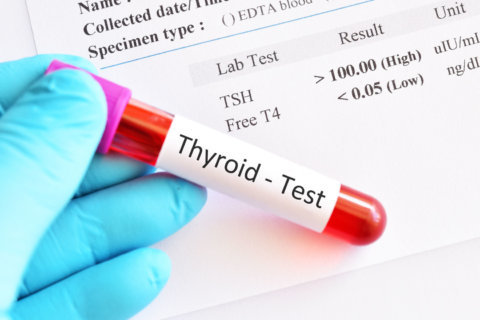WASHINGTON — We may be setting an all-new record this year in the amount of meat we eat.
The U.S. Department of Agriculture projects that, on average, Americans will consume 222 pounds of red meat and poultry this year. Sally Squires, who writes the Lean Plate Club™ blog says many of us may be getting more protein than we really need.
Squires broke down the facts of the American appetite when it comes to protein with WTOP.
Squires said 2015 dietary guidelines suggests that about 20 percent of daily calories should be from protein. So for an adult who has about 2,000 calories per day that works out to 400 calories.
“In actual food, that means that for women that’s about five to five and 1/2 ounces a day of meat or poultry,” Squires said. “For men, it’s a little bit more — it can go up to six ounces a day.”
According to Squires, most Americans actually meet the daily recommended intake for protein. But the problem is sometimes the protein sources we choose are too high in saturated fat and sodium.
“Think about processed meats or those fatty cuts of meat or poultry with the skin and the fat,” Squires told WTOP. “That’s where we can not only get extra calories, but we get the types of unhealthy fat and added sodium that none of us need.”
There’s a big push to use more sustainable forms of protein, including plant based protein, farm-raised seafood, and other sustainable forms of protein.
“Actually even the U.S. government has said most of us should be eating a plant-based diet.” Squires said. “Because there is this really big push — can we as a global community really afford to eat protein at the levels that we’ve been consuming it?”
Overall, protein is rich in essential amino acids and other nutrients.
These include B vitamins (niacin, thiamin, riboflavin and B6), vitamin E, iron, zinc and magnesium. These nutrients are important for healthy bones, muscles, cartilage, skin and blood. We need protein to produce enzymes, hormones and vitamins.
Squires said B vitamins found in protein also help the body release energy, play a vital role in the function of the nervous system, aid in the formation of red blood cells and help build tissues.
Protein contains iron needed for carrying oxygen in the blood and for healthy brain development. Magnesium is used in building bones and in releasing energy from muscles. Zinc is necessary for biochemical reactions and helps the immune system function properly. EPA and DHA are omega-3 fatty acids found in varying amounts in seafood.
According to Squires, eating 8 ounces of seafood per week may help reduce the risk for heart diseases.








